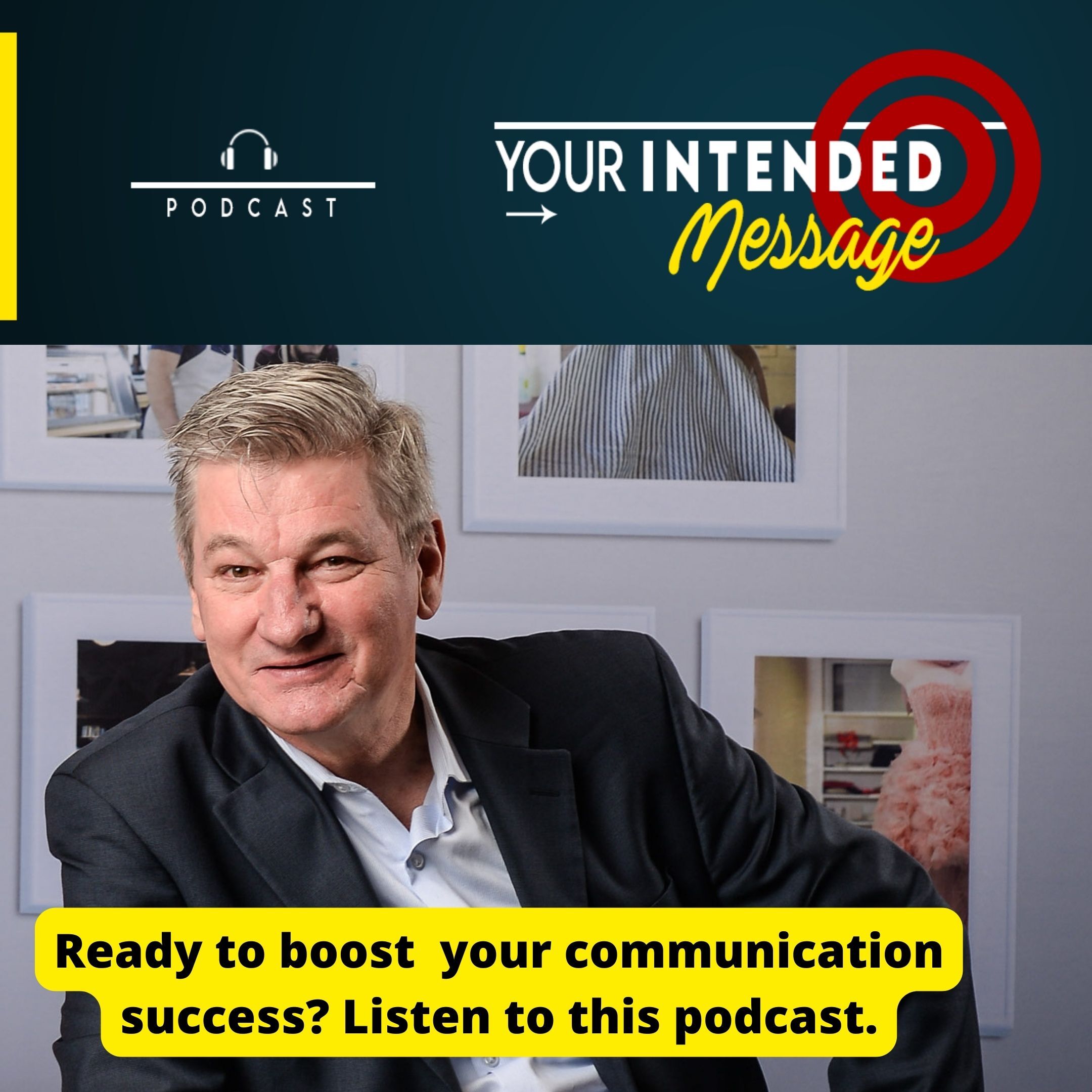
17.1K
Downloads
289
Episodes
The podcast about Effective Communication in Business
Better communication skills will advance your career and business. Are you ready to enhance your understanding and results from better communication? Listen and learn how to deliver Your Intended Message.
Are you willing to cross-examine communication from various perspectives? Would you like to deliver your intended message more effectively?
Listen to Your Intended Message to gain a powerful advantage in your ability to convey your message to your audience, team, clients or marketplace.
Learn from the mistakes and success of communication experts from around the world from different scenarios.
The better communicator has the competitive advantage.
Imagine what that means to you when you improve the success of your next conversation, presentation or message.
Your Host - George Torok
Episodes
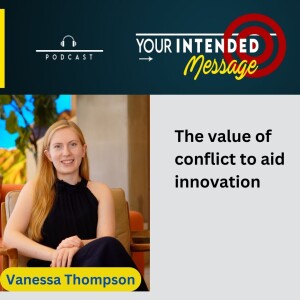
Friday Jan 17, 2025
Drive Innovation with Conflict: Vanessa Thompson
Friday Jan 17, 2025
Friday Jan 17, 2025
How diversity of thought drives breakthrough ideas
The role of effective communication in innovation
Episode 239 (Vanessa is based in California)
In this conversation with Vanessa Thompson we explore:
- Why conflict is a natural and necessary part of the innovation process.
- How a shared vision can align and inspire diverse teams.
- The role of small, tangible victories in maintaining momentum toward big goals.
- The importance of creating psychological safety to encourage creativity.
- How diversity of thought leads to better outcomes and breakthrough ideas.
- The power of active listening in unlocking new opportunities.
- The dual role of leaders as motivators and active listeners.
- Why innovation needs structure: lessons from Pixar and other organizations.
- How storytelling can engage teams and reinforce organizational goals.
- Practical strategies for overcoming market challenges and driving change through innovation.
-----
About our guest, Vanessa Thompson:
She has spent the past 10 years working at the intersection of cleantech, finance, and innovation, where I’ve been part of Silicon Valley startups and venture capital groups driving meaningful change.
Vanessa is writing a book on innovation, featuring 60 case studies that provide practical, results-based insights for businesses to break free and thrive, even during challenging times.
Learn more about Vanessa Thompson and how to arrange her to speak to your team.
https://www.vanessathompson.com/
-----
Key Learning Points
1. Conflict is Essential for Innovation
Healthy conflict fosters diverse perspectives, enabling creative problem-solving.
2. Shared Vision Drives Success
A clear, authentic shared vision unites teams and motivates individuals.
3. Small Wins Build Momentum
Celebrating small wins helps teams stay motivated and believe in achieving larger goals.
4. Psychological Safety Enables Creativity
Teams need an environment where dissent is encouraged and valued.
5. Diversity of Thought is Key to Innovation
Diversity in skills and perspectives enhances decision-making and creativity.
6. Listening Unlocks Unexpected Opportunities
Engaging with stakeholders and valuing their input can reveal untapped potential.
7. Leaders as Cheerleaders and Listeners
Leaders must inspire teams and genuinely consider their input.
8. Structure Around Creativity
Establishing dedicated spaces or processes for creative thinking fosters innovation.
9. Storytelling Engages and Motivates Teams
Stories make abstract goals relatable and memorable.
10. Mutually Beneficial Goals Resolve Conflict
Aligning on shared goals helps teams overcome disagreements.
-----
Read the rest of this entry »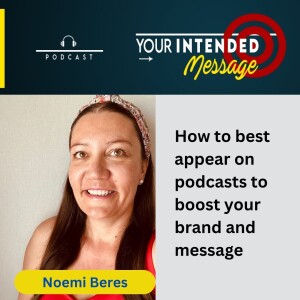
Thursday Jan 09, 2025
Boost your brand as a podcast guest: Noemi Beres
Thursday Jan 09, 2025
Thursday Jan 09, 2025
Build your brand and authority with podcast guesting
Be a podcast guest to boost your career and business
Episode 238 (Noemi is based in Cyprus)
In this conversation with Noemi Beres we explore:
- The Growing Value of Podcast Guesting: Why it’s a powerful long-term strategy for building your brand and authority.
- Crafting a Memorable Story: Tips to effectively condense and share your story on podcasts.
- Building Authentic Relationships: How to develop meaningful connections with podcast hosts and audiences.
- Podcast Guest Preparation: Key steps to prepare for podcast appearances, including research and mindset.
- Leveraging Podcast Appearances: Strategies to maximize the value of your podcast content post-publication.
- The Importance of Consistency: Why guesting on podcasts regularly builds credibility over time.
- Avoiding Common Mistakes: Key missteps podcast guests make and how to avoid them.
- Authenticity Over Perfection: Embracing your natural self, including overcoming language barriers or nerves.
- Balancing Quality and Quantity: Finding the right podcasts that align with your brand and goals.
- Repurposing Content Effectively: Creative ways to extend the lifespan of podcast appearances.
-----
About our guest Noemi Beres:
Noemi is a podcast guesting expert and entrepreneur who rebuilt her business to six figures after losing it during the pandemic.
She's co-founder of Podcast Connections, a podcast booking agency that helps thought leaders get booked on the right podcasts.
https://www.podcastconnections.co/
----
Insights from this conversation
Key Learning Points
-
Advantages of Podcast Guesting:
- Builds brand authority and boosts online presence through SEO.
- Creates evergreen content that remains accessible indefinitely.
- Offers a platform for authentic connection with audiences and hosts.
-
Preparation Is Key:
- Research the podcast before appearing—listen to episodes to understand style and tone.
- Clearly define topics and talking points to avoid "winging it."
-
Relationship-Building:
- Respect and acknowledge the host's effort with gestures like thank-you notes.
- Treat podcast guesting as the start of a relationship, not just a promotional opportunity.
-
Authenticity and Confidence:
- Be yourself and embrace imperfections, even if English isn't your first language.
- Practice and improve with each appearance.
-
Strategic Approach:
- Focus on quality over quantity when selecting podcasts.
- Consistency and persistence are crucial for long-term success.
-
Content Repurposing:
- Maximize the value of appearances by creating clips, quotes, and social media posts.
-
Mindset and Presence:
- Avoid rushing into interviews; take time to prepare and be mentally present.
------
Read the rest of this entry »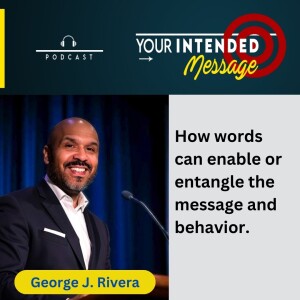
Thursday Jan 02, 2025
Why Language is Behavior: George J. Rivera
Thursday Jan 02, 2025
Thursday Jan 02, 2025
Overcoming Fear and Anxiety in Leadership Communication
How to Self-Soothe Before Difficult Conversations
Episode #237 (George is based in New York City)
In this conversation with George J. Rivera we explore:
- The deeper meaning of behavior and communication, and why understanding the 'why' is essential for meaningful interactions.
- How to handle difficult conversations with strategies like mental rehearsal and reflection for improved outcomes.
- The role of leaders in shaping physical and emotional environments to support team success.
- The importance of psychological safety in fostering creativity, collaboration, and authenticity in teams.
- Techniques for using humor and empathy to reduce stress and enhance communication.
- The critical connection between leadership and environmental awareness, from physical settings to cultural dynamics.
- Lessons from nature, like mangrove trees, that reveal how creating the right conditions enables people to thrive.
- The value of self-awareness in leadership and its impact on team dynamics and organizational culture.
-----
About our guest George R. Rivera:
Here are the key learning points from the interview with George Rivera:
1. Understanding Behavior and Communication
- Behavior is not labeled as "good" or "bad"; it always serves a function based on context and underlying motives.
- Language itself is considered a behavior and reflects deeper thought processes and emotions.
2. Strategies for Handling Difficult Conversations
- Self-Soothing Techniques: Use cognitive behavioral exercises like "time travel" to mentally rehearse the conversation and reflect afterward.
- Anticipate possible responses and prepare for them to maintain composure and improve outcomes.
- Acknowledge and manage perceived consequences to reduce avoidance or fear.
3. Leadership and Environmental Awareness
- A leader’s awareness of the physical and emotional environment is critical for team success.
- Environmental factors, such as physical space, communication systems, and the leader’s demeanor, significantly impact team dynamics.
- Leaders themselves are a central part of the environment they influence.
4. Psychological Safety in Teams
- Creating a sense of psychological safety fosters risk-taking, creativity, and authentic communication within teams.
- Leaders can encourage openness by modeling vulnerability and gradually introducing opportunities for team members to share thoughts and feelings.
5. Building Better Team Communication
- Structure communication to suit the needs of the team, balancing technology (e.g., email, messaging) with opportunities for live interaction.
- Recognize environmental stressors, such as overcrowded or noisy spaces, that can hinder communication.
6. Using Humor and Empathy
- Humor, particularly self-deprecating humor, can reduce stress, build trust, and foster openness in communication.
- Empathy allows for better acknowledgment of others’ perspectives, reducing defensiveness and conflict.
7. Lessons from Nature: Mangrove Trees and Leadership
- The mangrove tree analogy highlights the importance of creating an environment conducive to growth and thriving, much like the tree’s ecosystem supports unique organisms.
- Leaders should act like "mangrove trees," fostering collaboration, diversity, and interconnectedness.
8. Encouraging Collaborative and Inclusive Leadership
- Leaders should:
- Reflect inwardly on their role in shaping the environment.
- Promote open and honest communication over time.
- Foster collaboration and a shared purpose to reduce stress and enhance teamwork.
Would you like these summarized for a specific audience, such as LinkedIn readers or podcast listeners?
-----
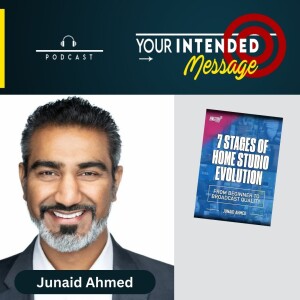
Thursday Dec 26, 2024
Million Dollar Mindset: Junaid Ahmed
Thursday Dec 26, 2024
Thursday Dec 26, 2024
Mindset and Mastery for success
How to get started on your path
Episode 236 (Junaid is based in Virginia)
In this conversation with Junaid Ahmed we explore:
1. The essence of the million-dollar mindset and how to cultivate it.
2. Breaking large goals into manageable, actionable steps.
3. How to build a professional-grade home studio on a budget.
4. Lessons from 600 interviews about communication and transformation.
5. The importance of community and mentorship in achieving goals.
6. Overcoming self-doubt and fostering an abundance mindset.
7. Using preparation to make success seem "overnight."
8. Why giving value leads to reciprocal growth.
9. Finding the right people and resources to accelerate learning.
10. Practical advice for mid-career professionals looking to advance.
-----
About our guest, Junaid Ahmed:
He is the Home Studio Architect and creator of Home Studio Mastery, a program that helps podcasters, content creators and entrepreneurs transform their spaces into professional-grade studios.
He is host of the Hacks and Hobbies podcast where he has interviewed over 600 guests.
He is author of "Seven Stages of Home Studio Evolution". You can learn more about his marketing agency at:
Discover how to transform your home studio at: https://homestudiomastery.com/
-----
Excerpts from this conversation with Junaid Ahmed:
Key Learning Points:
1. The Power of Starting Now: Delaying actions leads to lost opportunities. Begin immediately, even with small steps.
2. Break Down Big Goals: Simplify large goals (e.g., making a million dollars) into actionable daily steps.
3. Mindset Shift: Adopting an abundance mindset over scarcity fosters opportunities and connections.
4. Preparation Matters: Success often appears sudden but requires years of consistent effort.
5. Learn from Others: Surround yourself with mentors and communities to learn and grow.
6. Give Before You Take: Focus on providing value to others, fostering trust and reciprocity.
7. Leverage Existing Resources: Affordable tools and established methods can help you start quickly.
8. The Importance of Clarity: Define your "why" before embarking on any journey.
9. Continuous Improvement: Reflect on your efforts to identify areas for growth.
10. Community Encouragement: A supportive network can drive perseverance and success.
---
Adopting the Million Dollar Mindset
1. Start Now: Delay only creates missed opportunities.
2. Define Your Goal: Get clear on what you want and why it matters.
3. Break It Down: Divide large goals into achievable tasks.
4. Prepare for Success: Invest the time and effort upfront to enable scalability.
5. Adopt a Positive Mindset: Embrace abundance and openness.
6. Learn from the Best: Seek mentors and communities who share your values.
7. Give Generously: Share your knowledge and resources freely.
8. Practice and Reflect: Continuously improve through feedback.
9. Leverage Affordable Tools: Use existing technology and resources to build your foundation.
10. Find Support Systems: Surround yourself with people who encourage and inspire.
-----
Read the rest of this entry »
Thursday Dec 19, 2024
Mastering Soft Skills for Tech Professionals: Evgeniy Kharam
Thursday Dec 19, 2024
Thursday Dec 19, 2024
The Art of Explaining Complex Ideas with Ease
Communicating Tech to Non-Tech Audiences
Episode 235 (Evgeniy is based in Toronto, Canada)
In this conversation, we explore:
- The importance of breaking down technical jargon into relatable concepts.
- How soft skills can elevate technical professionals' success.
- Why feedback and audience awareness are essential in communication.
- Techniques for maintaining engagement in virtual meetings.
- The role of passion in conveying credibility.
- Using hooks and metaphors to make connections.
- How to practice communication skills in everyday interactions.
- The significance of preparation and habits in presentations.
- Strategies for leadership communication in technical fields.
- How personal connections can improve professional interactions.
-----
About our guest Evgeniy Kharam:
Has over 40,000 hours of experience in cyber security.
Overcame many speaking challenges, including speaking too fast, stuttering and afraid to speak in groups.
Author of "The Art of Soft Skills in Technical Sales"
Learn more about his book and services at https://www.softskillstech.ca/
-----
Excerpts from this conversation with Evengiy Kharam:
Key Learning Points:
-
Simplifying Complex Ideas: Technical experts need to break down complex ideas using analogies and metaphors that anyone can understand.
-
Soft Skills Matter: Mastering soft skills, such as emotional intelligence and communication, is critical for technical professionals.
-
Know Your Audience: Tailoring communication styles to your audience—whether business leaders or customers—helps deliver messages more effectively.
-
The Power of Passion: Genuine enthusiasm and passion can make even the most technical topic engaging.
-
Feedback is Key: Asking your audience if they understand and adapting to their learning style improves communication effectiveness.
-
Use Hooks: Create personal connections or points of curiosity (hooks) to engage your audience right away.
-
Body Language and Eye Contact: Proper virtual communication, such as camera positioning and maintaining eye contact, is crucial in remote settings.
-
Practice Habits: Develop communication skills by practicing small talk in everyday situations.
-
Prepare for Presentations: Beyond knowing your slides, focus on breathing, tone, and relaxation techniques to deliver confidently.
-
Leadership Communication: Understanding what motivates your team and management helps align communication for better outcomes.
-----
Read the rest of this entry »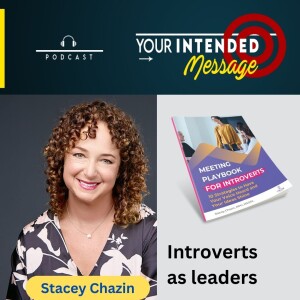
Thursday Dec 12, 2024
Introverts as Leaders: How to Thrive in an Extroverted World: Stacey Chazin
Thursday Dec 12, 2024
Thursday Dec 12, 2024
How Introverts Can Lead and Communicate Effectively
The Super Power of Introverts
Episode 234 ( Stacey is based in New Jersey)
In this conversation, we explore:
- How introverts can harness their strengths to thrive in leadership roles.
- Effective strategies for introverts to participate confidently in meetings.
- The misconceptions surrounding introversion and leadership potential.
- Ways leaders can create inclusive environments for both introverts and extroverts.
- The importance of self-awareness and authenticity in professional growth.
-----
About our guest, Stacey Chazin:
She holds a master's in organizational development and leadership, degrees in marketing and communication, and a certification in the Myers-Briggs Type Indicator Assessment.
Stacey is a proud introvert who grappled for decades with societal expectations that favored extroversion.
Instead of conforming to societal pressures, she embraced her introverted qualities, turning them into powerful assets that allowed her to thrive, both professionally and personally. She now coaches other introverts to do the same.
Get the free copy of Daily Productivity Hacks for Interviews
https://ifactorleadership.cohttps://ifactorleadership.com/productivity/m/productivity/
Get your free copy of Meeting Playbook for Introverts.
https://ifactorleadership.com/gift/
-----
Excerpts from this conversation with Stacey Chazin:
A common misconception is that introverts are shy or incapable of leading. As Stacey explains, “Introversion is not about shyness; it’s about how we get our energy.” While extroverts thrive in group settings, introverts recharge by having time alone or engaging in deep, focused thought.
So, how can introverts succeed in meetings, where speaking up is often equated with competence?
Stacey highlights a three-step approach for introverts to shine:
-
Before the Meeting: Preparation is key. Request the agenda in advance and develop talking points. As Stacey advises, “Having data or narrative examples ready helps you feel confident.”
-
During the Meeting: Don’t pressure yourself to speak first. Set a goal of sharing two or three points and check them off as you go. If asked to respond on the spot, Stacey suggests saying, “I’d love to give this some thought and follow up later.”
-
After the Meeting: Follow up with a well-crafted email. Stacey notes, “Introverts often excel at writing, which allows time to process thoughts.”
Introverts also bring unique leadership strengths. Stacey points out that deep listening, empathy, and calmness in conflict are powerful assets. “These qualities help you understand your team and guide them effectively,” she says.
-----
Read the rest of this entry »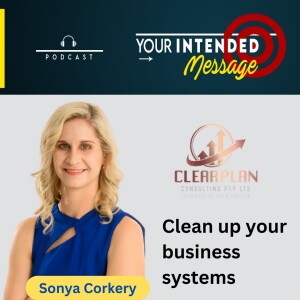
Thursday Dec 05, 2024
Better Business Systems and Processes: Sonya Corkery
Thursday Dec 05, 2024
Thursday Dec 05, 2024
Build a Thriving Business with Clear Communication
Clear the Clutter: Streamline Your Business for Success
Episode 233 (Sonya is based in Australia)
In this conversation, we explore:
-
The Importance of Systems and Processes in Business
- How a lack of systems and processes leads to inefficiencies and constant "firefighting."
- Strategies for developing effective operating systems that streamline operations and boost profitability.
-
Effective Communication as the Foundation for Success
- The critical role clear communication plays in team collaboration and client relationships.
- Methods to establish consistent messaging and improve internal and external communications.
-
Gaining Objectivity Through External Business Assessments
- The value of bringing in an outside perspective to identify inefficiencies and growth opportunities.
- How to conduct a business audit to uncover stress points like cash flow issues and staff turnover.
-
Managing Ego and Embracing Change for Growth
- Recognizing when ego hinders business progress and team dynamics.
- Tips for being open to feedback and making changes that benefit the whole organization.
-
Preparation and Mindset: Doing Your Future Self a Favor
- The concept of preparing today to set yourself up for success tomorrow.
- How routines, checklists, and even "uniforms" can enhance productivity and reduce decision fatigue.
-
Building Genuine Connections Through Energetic Interactions
- The impact of authentic communication on building trust with clients and team members.
- Moving beyond rote phrases to create meaningful and personalized interactions.
-
Listening to Team Members on the Front Lines
- Leveraging the insights of employees who handle day-to-day operations.
- Involving your team in decision-making to enhance engagement and implement better solutions.
-
The Psychological Benefits of Organization and Planning
- How feeling organized reduces stress and provides peace of mind.
- Small actions that compound over time to significantly improve personal and business efficiency.
-
Navigating the Unique Challenges of Family Businesses
- Balancing personal relationships with professional roles within a family-run business.
- Establishing clear communication and boundaries to ensure mutual respect and business success.
-
Accepting Feedback and Turning Challenges into Opportunities
- Embracing constructive criticism as a catalyst for improvement.
- Understanding that change is necessary to achieve different and better outcomes.
Join us as we delve into these topics with Sonya Corkery, who shares her expertise on cleaning up businesses, enhancing communication, and setting yourself up for future success.
-----
About our guest, Sonya Corkery:
Sonya had an extensive corporate career in finance. That includes time as a financial planner, bank manager and commercial lender.
She and her husband owned and operated a successful multimillion-dollar electrical contracting business for 16 years.
Learn more about Sonya and how she might help your business at
https://clearplanconsulting.com.au/
-----
Excerpts from this conversation with Sonya Corkery:
Key Insights from Our Conversation with Sonya Corkery
Get ready to transform your business with actionable insights! In this episode of Your Intended Message, we sat down with Sonya Corkery, a seasoned consultant helping businesses clean up their operations, streamline processes, and achieve sustainable growth. Here’s a sneak peek into the conversation:
Q: What does it mean to "clean up a business"?
Sonya:
We joke about being the “janitors of the business world” because we come in, tie up loose ends, and establish systems and processes. Many businesses lack a framework and operate in constant crisis mode. We help assess these gaps, implement solutions, and make life easier for business owners.
Q: What’s the most common issue you see in businesses?
Sonya:
The biggest problem is a lack of systems and processes. Owners often start with a great idea but don’t have the tools to turn it into an efficient operation. Clear systems streamline workflows, ensure consistency, and make training new team members much easier.
Q: Why is communication such a critical part of business success?
Sonya:
Communication is at the heart of everything. Without clear communication, you’re not giving your team or clients the best chance at success. Documenting processes and ensuring consistent messaging is vital for maintaining quality and alignment within a business.
Q: How do you handle resistance from business owners who don’t want to change?
Sonya:
It’s tough for anyone to hear they’ve made mistakes. I always say, “You’re not alone in this; many people face the same challenges.” We approach the situation objectively, showing how small changes can lead to better outcomes. Sometimes they need time to process feedback, and that’s okay—it’s all part of the journey.
Q: What advice do you have for getting into the right mindset?
Sonya:
I always say, “Do your future self a favor.” Prepare today for what you’ll need tomorrow. Whether it’s making notes for a meeting or setting up a process, these small actions compound over time. Even something as simple as wearing the right “uniform” for a task can help set your mindset for success.
Q: What’s the key to working effectively in a family business?
Sonya:
Communication is even more critical in family-run businesses. Early on, my husband and I had to learn to separate our egos from what was best for the business. Clear boundaries, open dialogue, and mutual respect are essential for balancing personal and professional dynamics.
Q: How can businesses use feedback to improve?
Sonya:
Feedback, even when it’s uncomfortable, is a gift. I tell business owners to sit with it and reflect. Change is hard, but continuing with the same approach will give you the same results. By addressing feedback, you open the door to growth.
Why listen to this episode?
Whether you're a seasoned entrepreneur or just starting, Sonya’s insights on systems, communication, and mindset will inspire you to tackle your business challenges head-on. Don't miss her advice on preparing for success and creating genuine connections in your business.
-----
Read the rest of this entry »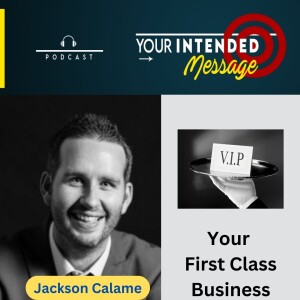
Thursday Nov 28, 2024
Build a First Class Business: Jackson Calame
Thursday Nov 28, 2024
Thursday Nov 28, 2024
How to Build an Elite Team for Your Business
Your Batman needs an Alfred
Episode 232 (Jackson is based in San Antonio, Texas)
In this conversation with Jackson Calame we explore the keys to building a first-class business and the foundational principles for entrepreneurial success."
- Why first-class service is non-negotiable for thriving businesses.
- The hidden power of infrastructure and why it’s often overlooked by entrepreneurs.
- How to transition from solopreneur to team leader and scale effectively.
- The critical role of assembling the right team and identifying visionary traits in business partners.
- The importance of ethics and authenticity in sustainable business growth.
- The combine approach to selecting elite talent, inspired by professional sports.
- Balancing efficiency with customer experience to create raving fans.
- Why relying solely on automation and AI can be risky without a clear communication strategy.
- Aligning personal values with business goals to create meaningful success.
- How intentional messaging and clear communication set businesses apart from competitors.
-----
About our guest, Jackson Calame:
Jackson teaches visionary entrepreneurs how to unlock sustainable revenue growth and expand their legacy by becoming a Power Brand in their market. 96% of businesses fail within the first 10 years. Jackson teaches businesses, not only how to avoid failure, but how to win, by becoming a true leader in their market.
You are invited to attend the Power Launch Webinar.
https://go.firstclassbusiness.io/power-launch-webinar
-----
Excerpts from this conversation with Jackson Calame:
Jackson, let's talk about what first class business does for entrepreneurs that entrepreneurs fail to do for themselves. Where do you start? Absolutely.
Well, come out hitting hard and heavy. So our tagline on our website may make a lot of you laugh in a good and appreciative way.
It says, Hey, Batman, let us be your Alfred, right? And what does that mean? That means one, we want to work with superheroes, people who are contenders in the market, not pretenders.
We also want to come in and provide all of that back end infrastructure that often gets overlooked, maintaining the house, maintaining the balance, making sure that the schedules are operating efficiently, making sure Batman doesn't go out there and die when I was just trying to save the world.
There's so many things that need to be done in order to truly help somebody scale and have a proper balance and serve their market and be there for the family and the whole it's a lot so many entrepreneurs either take that for granted on one side, and we've got to stop doing that if we really want to build.
Or on the other side, if you're the Batman listening into that right now and you're like, oh my gosh, I need that act on it, you know, start looking for who is going to help you build that really unsexy, boring thing that almost no podcasts talk about, called infrastructure, truly that simple infrastructure
-----
First Class business means that we literally cannot provide a second class service. Our clients won't accept it.
-----
Read the rest of this entry »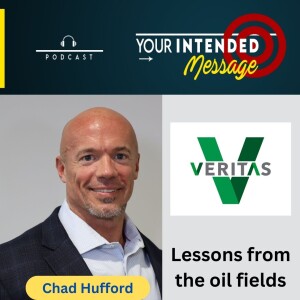
Thursday Nov 21, 2024
The Power of Analogies in Financial Planning: Chad Hufford
Thursday Nov 21, 2024
Thursday Nov 21, 2024
7 Life Lessons from Oilfields to Retirement
How Emotional Baggage Impacts Your Finances
Episode 231 (Chad is based in Alaska)
In this conversation with Chad Hufford we explore:
- Why Conventional Wisdom Often Fails in Financial Success
- The Role of Emotional Baggage in Financial Decision-Making
- The Influence of Financial Media on Misconceptions
- The Importance of Shifting Perspectives for Financial Independence
- Building a Financial Blueprint for Success
- The Difference Between Income and Principal in Financial Freedom
- Focusing on What You Can Control in a Volatile Economy
- The Role of Trust and Relationships in Financial Advising
- Retiring To, Not From: The Importance of Purpose in Financial Independence
- The Power of Analogies to Simplify Complex Financial Concepts
About our guest, Chad Hufford:
Chad owns a boutique financial planning firm, Vertitas Wealth Management. He partners with Dave Ramsey as one of his SmartVestor Pros. He is the author of Forging Financial Freedom. He is born and raised in Anchorage, Alaska.
You can get your copy of his book along with the free bonuses here
www.forgingfinancialfreedom.com
-----
Excerpts from this conversation with Chad Hufford:
Delighted to be talking with you and I somehow I just think just living and growing up in Alaska is got to give you a different view of the world. Do you agree with that?
Well, quite literally, it gives me a different view of the world. We're so high up on latitude that, yeah, every everything's different up here. But, you know, I think it's been actually really powerful for me.
You know, one of the things we talked about in previous conversations is, you know, when we try to have an intended message come across, sometimes we do have to change somebody's perspective in order to see it clearly.
And I think, coming from Alaska, we do automatically have such a different perspective. It just It lends itself to the reframing or reshaping of somebody's paradigm or perspective, and it's just, it's a wonderful place to live. It's not always easy 35 degrees this morning on my drive into the office.
But you know what? It's beautiful, and it's home- and that's 35 degrees Fahrenheit.
I guess we just started the fall, ended this summer? Yeah, summer here ended a few weeks ago, I think, if we're being honest. But yeah, 35 degrees Fahrenheit.
So like one, one degree, two degrees Celsius, it's, it's, it's crisp out there. But you know what we had? We had a huge black bear come through our yard. The other day.
We had a lynx outside. And where we live in Anchorage. it's 300,000 people. It's a normal town. We're now out in the boonies, but we live on the very edge of Anchorage, so we get wildlife in our backyard all the time. And it's such a blessing.
-----
Read the rest of this entry »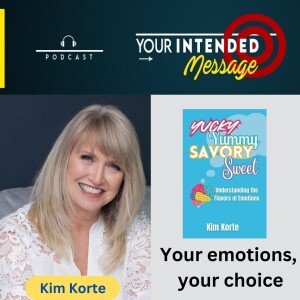
Thursday Nov 14, 2024
How to take control of your emotional reactions: Kim Korte
Thursday Nov 14, 2024
Thursday Nov 14, 2024
The Recipe of Emotions: Crafting Responses for Success
Emotion as Sensation: How Our Past Shapes Our Emotional Responses
Episode 230 (Kim is based in San Francisco)
In this conversation we explore:
- The Connection Between Emotions and Sensory Experiences
- Why Emotional Awareness Matters in Both Life and Leadership
- Practical Strategies to Gain Control Over Your Emotions
- How to Avoid Being a ‘Slave’ to Your Emotions
- The Power of Emotional Granularity
- Using Interoception to Improve Emotional and Physical Awareness
- How to Rethink Negative Experiences Through Conscious Reframing
- Balancing Compassion and Empathy as a Leader
- Daily Practices to Connect with Your Emotions
- How Emotions Serve as Tools for Learning and Growth
About our guest, Kim Korte:
Kim Korte hosts the Flavors of Emotions podcast and is the author of Yucky Yummy Savory Sweet: Understanding the Flavors of Emotions.
She offers a process to help us make sense of our feelings through the lens of a chef understanding flavors in a recipe.
This unique approach to emotion management blends culinary metaphors with emotional education in a digestible format, making the complex world of feelings accessible and actionable.
As a Sensory Perception and Emotion Management Strategist, she aims to help people develop creative action around how they experience the world and their emotions.
Learn more about Kim and and her book https://www.kimkorte.com/
Listen to her podcast "Flavors of Emotions: https://www.flavorsofemotions.com/
-----
Excerpts from this conversation with Kim Korte:
In your book, you compare emotions to food and and sensation. Food sensations and flavors. How did you come up with that connection?
I learned about the theory of constructed emotions, which is a very common and probably fairly widely accepted idea that we construct our emotions using our experiences, kind of like ingredients that and a recipe.
And I got this idea after reading how emotions are made, The Secret Life of the Brain, by Lisa Feldman Barrett.
It was an eye popping book, and it got me to think about how if emotions are created from perceptions, then our whole world is like giving us ingredients that we use, and the recipes are everything that we've experienced previously.
So we're always living today in the past, unless we're more conscious of what's going on in our current experience.
That level of consciousness is what helps us to examine and change the quote, unquote recipe if it's not the right one, or if it's not working for us and the process of flavor, it's not a sense sensory system, like everything that we taste, everything we see, all of these things, these are sensory systems.
And taste is a combination of sensory systems you taste with your nose, you taste with your mouth. They even have shown that what you see and what you hear like, if it's crunchy, you think it's fresh, but even music going on around you, you might think, Oh, this music isn't impacting me, but it really can impact the flavor and your experience of food, and the same is true of our emotions.
Everything that we experience is a our emotions, rather are a combination of our sensory experiences. That's what influences us. So this is where I got these food metaphors and cooking metaphors.
-----
Think of it like a pepper. There's different kinds of peppers, there's bell peppers, and there's jalapenos, and there's habaneros.
And yet, we don't attribute hot spiciness to every single pepper out there, right? Because we've learned to distinguish the differences situationally and. Experientially of different peppers.
And so the same can be true with our fears, because we tend to have this like one size fits all approach to a lot of emotions, and we we feel one emotion more than others, and we haven't allowed ourselves to recognize that fear can be like a pepper, even love can be like a pepper, and have different gradations of it, different levels of quote, unquote, heat.
And with that, you are able to break down that fear into seeing it in its different states. It could be irked, could be nervous. It could be irate, you know? It could be, you know, I need to run for the door, panic. Same with love....
-----
Read the rest of this entry »